All entries for Tuesday 22 July 2014
July 22, 2014
The First Cultural Economy International Summer School
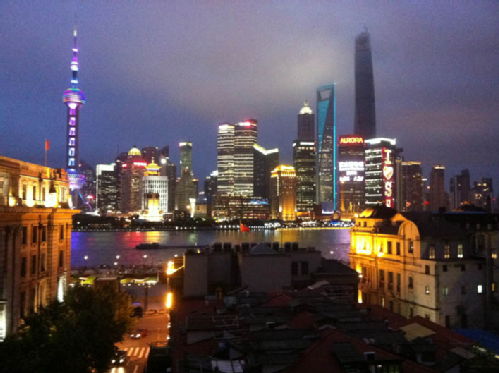
This is a view of Shanghai Pudong from a bar we liked to frequent after a hard days study ! The First Cultural Economy International Summer School -- one of the activities of the newly established Shanghai City Lab -- has just been held at the Shanghai Jiaotong University (SJTU). It is organized as part of a broader venture called the Shanghai City Lab, just funded as a Warwick-Monash Alliance project (but with supplementary funds from Monash and SJTU). It was a success, and enjoyed by the eight faculty and the 37 students enrolled. See: www.shanghaicitylab.com
The students at this first summer school came from all over China and from Melbourne Australia – masters, PhD students and cultural sector professionals. The school was held on the hospitable old campus of the university, situated on the southern edge of the old French concession. It began on Monday morning with a group photo against the monument in the central park of the campus. It continued with ten days of lectures, talks, field trips and student group work, punctuated by a weekend break. Until the official photo of the whole group arrives – here are some informal ones….(some weird distortion make Justin and Shane on the left look shorter, when they are far taller!).
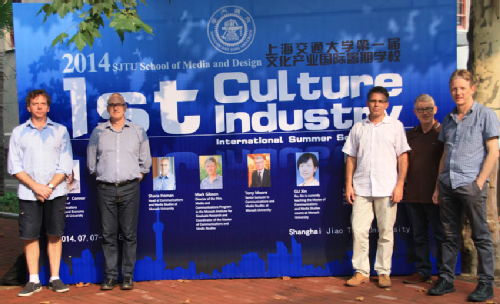
SJTU translated cultural 'economy' as cultural 'industry', which for them made more sense -- for us, of course, the meaning is a little more specific. Professor Shan Shilian and Prof. Li Kang Hua of SJTU delivered detailed lectures on cultural policy and creative industries in China, and specifically in Shanghai -- policy insights hard to obtain outside China. The Chinese government has massively invested in both the creative industries and creative cities policy trends, both of which oscillate between an urban development agenda and hard-nose small business incubation.
The growth of Shanghai is something we witness every time we return – huge new art museums, shopping malls and apartment blocks. In our field trips we visited (among other places) the M50 cluster and 1933 cluster, where at the latter (in the Centre for the Creative Industries) we held a short seminar. We further explored the contemporary art scene and creative urbanism of the old EXPO site, the Long Museum (Pudong), Rock Bund Art Museum, and The Power Station of Art. In the evenings we walked, ate and drank in the French concession, the Bund, Xintiandi and Tianzifang, among other places.
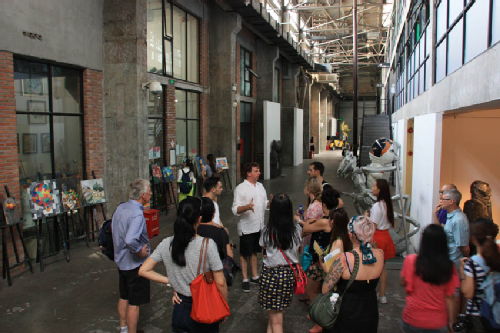
We also got highly stimulating talks on contemporary Shanghai by resident American Lisa Movius (director of the MAO Livehouse contemporary music centre) and from Ireland, Connor Roche (the lead in BOP cultural consultancy Shanghai office) and David Lee – pioneer in the growing ‘maker and hacker’ subcultures of China. The summer school ended on Friday 18th with the three student research groups presenting the results of their projects – on urban culture, cultural quarters and the independent music scene in Shanghai. I must say, we threw the students in at the deep end with urban research in the vast urban complex of Shanghai city. And we were taken aback by how well they did – and the summer school ended with the presentation of the certificates – by Professor Shan Shilian, Distinguished Professor of SJTU and a national authority on cultural policy and economy in China.
What’s going to happen next year? This is the first summer school, and from our experiences and student feedback will develop an exciting, invigorating new program. The Shanghai City Lab, which runs the summer school, is developing an international research profile – but I’ll leave that for another blog. As for this last photo -- Sean is taking a group 'selfie' on his new extendible hand-held selfie pod.
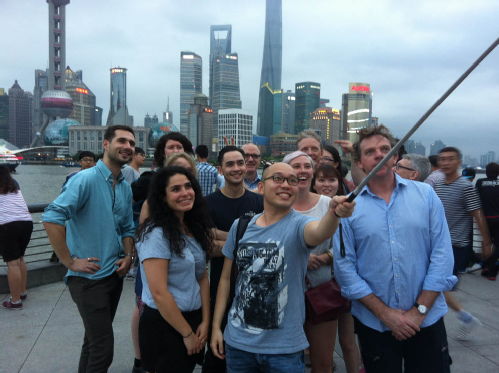
CATALYSE – European Centre for Creative Economy
Another late blog entry – I put it up here as this event generated a publication, which will appear in the next few months. Between 13 to 15 February, 2014, a group of Centre MA students accompanied me to a special seminar, hosted by the ‘ecce’ – the European Centre for Creative Economy (based within the complex of the well-known and new contemporary cultural centre, the Dortmund U). The seminar – called Strengthening Culture in Urban Developments in Europe – is one of a short series funded by a EU project called CATALYSE, and part of the new venture called ‘Forum D’Avignon Ruhe’ (along with a third parter, Bilbao Metropoli-30). The Forum D’Avignon (based in Paris) is a leading European cultural policy think tank, and has joined forces with ecce to develop policies for Europe’s leading landscape of innovation and creative industries – the German Ruhr. Ecce are become a leading think tank themselves and have produced many excellent publications (see their LabKULTUR TV website, which I have written for in the past).
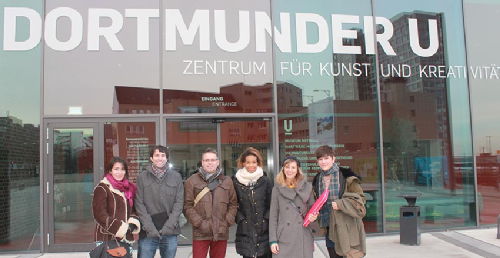
Our host was Dr Bernd Fesel, and Bernd and I did the lectures and convened the seminars over three days. The participants were Amina Isa-Maina, Elizabeth Alexandra Hewitt, Federico Maria Di Benedetto, Selina Thea Yasmine S. Welter, Agnesa Topuzyan, Tomi Oladepo. What was the subject? The CATALYSE seminars are designed to produce ideas, concepts and analytical frameworks for evaluating ‘spillover’ – the impacts, influences, and functions of culture in urban economies. This is a big subject, and the backdrop is the growing EU policymakers interest in measuring and evaluating the cultural sector and creative industries.
In the EU culture is becoming a major driver for urban development and the daily quality of life. From the EU structural funds 2007 – 2013 more than 6 Billion Euros was spent on culture. Still, investments in culture are viewed by policymakers in the EU with some scepticism, despite a lot of empirical evidence to the contrary. This perception gap was the motivation for CATALYSE, in part a way of preparing the ground for a larger project, providing more robust evidence and new evidence models for EU policy circles.
The seminar was held in the ‘U_raum’ of the spacious ecce offices. It began with general questions, like ‘how do we talk about culture and creativity outside the usual established historical discourses, or even outside new discourses of innovation management or the cultural studies of creative industries? How can we articulate the ways in which culture and creativity breach the boundaries of specialist practices within the arts, cultural sector or creative industry sub-fields, and impact or are used in other areas of social or industrial activity?’ The seminar gradually made its way to more specific problems on ‘How do we define the factors involved in ‘impact’ or the uses of ‘culture’ in the generation of non-cultural value? How can these factors – soft or hard – be measured? Which tools are necessary to raise awareness for the hitherto little-discussed effects of culture and urban change and how do you fill these ‘perception gaps’?’
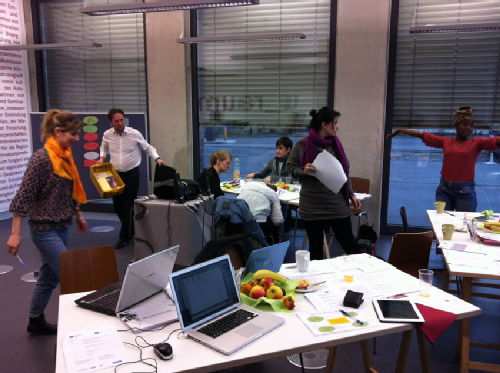
The Aims of the CATALYSE workshop were defined in advance in terms of informing current research on the spillover effects of culture and creative industries, (especially in urbanism), and extending the debates on qualitative and quantitative indicators of spillover effects. The method of workshop organisation was semi-structured, open ended, mixed-method approach, albeit class-based. There was one excursion around the adjacent Dortmunder U cultural centre, which informed our discussion on the arts sector. The seminar space was a multi-purpose room with all the usual resources. Students usually worked in two groups, on two tables, with moderators (four) moving in and between the groups. The structure of each day was focused around theoretical viewpoints, case studies and specific questions directed at the group by both Dr Fesel and myself. The structure of the investigation was intentionally dialogic and open ended – development through an informed dialogue between moderators and student participants – and cumulative, where specific instruction style lecture, then case study discussion, punctuated the day’s schedule.
Of course, the issues were difficult and so we were not expecting students to come up with straight solutions. They did, however, come up with a lot of interesting new criteria for thinking about the nebulous contextual realms of culture – the paper will be published by the ecce, as I said above, in the next few months. The CATALYSE seminars, however, were a preface to a larger project, discussed among a room of 20 leading young cultural policy researchers at the April 2014 meeting of the Forum D’Avignon Ruhr in Essen. I moderated the meeting, and for three hours we prepared the basis for a major EU-wide research project on ‘creative spillover’. The leaders are ecce’s Bernd Fesel, and Arts Council England’s Head of Policy and Research, Richard Russell. They both have an excellent grasp of the kind of project needed to spearhead some cultural policy advocacy in Brussels. Constructing this project is ongoing, but with seed funding we hope to start this autumn.
Midwest to Midville: Repositioning the visual arts in the Midlands
This was a blog I wrote after participating as a co-Chair of a seminar at the Ikon Gallery in Birmingham on the 3rd February. Belated, I know, but the seminar centred around a report that has generated a growing debate – on London’s domination of the UK arts sector and national funding regimes, along with the new national policy emphasis on the role of culture in local economy. The report was written by Peter Stark, Christopher Gordon and David Powell, and called ‘Rebalancing Our Cultural Capital: A contribution to the debate on national policy for the arts and culture in England’ (October 2013, see: www.theroccreport.co.uk). David Powell was the opening speaker of the day.

The event featured talks and panel debates, including acclaimed curator Matthew Higgs (New York), Birmingham art sector leaders (Jonathan Watkins, Debbie Kermode, Gavin Wade, and others), Birmingham city councilor Steve Trow, British contemporary art veteran Lynda Morris, and of course humble passengers like myself. It was one of those events that in the run up seemed like just another public seminar. Half way through the day I looked around and realized that this upper ‘loft’ gallery of the Ikon contained most of the central figures in the West Midland’s cultural scene, and turned out to be a gathering of some regional significance.
I’ll keep my remarks to the report, as my job was to chair David Powell. My favourite bit (p.38) is the report’s demand, phrased in terms of …what they spent on the Millennium Dome they give back to English regions [i.e. £600m]. Yet, the report is polemical without being polemic, and deliberately not written as protest or an invective animated by cries for justice. It is written as a sober series of observations on the economics of national arts funding as it has evolved since the post-war period, clearly pointing out the contradiction between national policy aims (for distribution and national impact) and a funding system irrationally skewed towards London. For ‘….the ‘centre’ in England makes decisions on 75% of the public’s funds available for the arts – a far higher proportion than in comparator countries’ (p.8: ES). That the capital needs a greater proportion of the funding is not in question, nor denied are the national and regional benefits of a strong capital centre for culture. What is in question is the basic policy rationales and the seemingly irrational assumption that the regions maintain a proportionately small and locally limited cultural infrastructure.
Personally, I like the report – it flags up some basic issues in relation to transparency and the lack of public information on national strategy-making, as well as frustrations that have been echoed since the 1950s. In fact, it is instructive to see how many of these issues emerged in the landmark 1965 White Paper (the only one!) ‘A Policy for the Arts: The First Steps’. Perhaps – at least this is my reading of recent history – the UK government’s wholesale rejection of the European regionalism movement in the 1980s (in part to form a front against the nascent Scottish independence lobby) has meant that the ‘strong city regions’ trend on the European continent did not emerge in Britain, to our detriment. A necessary devolution of the regions was botched in the New Labour period with the attempt to install city mayors, largely rejected by the city electorate themselves, and the quashed Scots independence movement has latterly come back to bite the London political establishment on the bum. Altogether national arts funding strategy is a skewed botch because the political settlement between London and its regions is a botch. One fact masking this reality is that the funding trend since the 1970s has seen Local Authorities fund culture (often via non-cultural budget heads) up to four times the amount of national arts funding itself. As the report is right to point out, as far as culture is concerned, the concepts of equality and equitable distribution of resources is ignored by the 2010 ACE strategy Achieving Great Art for Everyone (most major document since the 1965 White Paper], and was so ignored too by the Treasury Green Book guidance.
For Stark, Gordon and Powell – all of whom are cultural policy critics with a huge wealth of experience – the solution is actually modest. It takes the form of an adjustment to National Lottery funding, in a way that ‘London’s overall share of public funds for the arts would reduce from 65% …to 55% – still seven times the level of funding per head of population in the rest of England.’ This would take the form of a National investment Programme of £600m over the five years of the next parliament. The new fund would create ‘….additional 33% of arts funding per annum over five years: ‘….our proposition would locate new ‘strategic’ resources at regional and sub-regional level in partnership with collective local authority, business and civil society agencies charged with overall regional development. [See their published response to ACE response: p. 5].
With the RDAs gone, the attenuation of already small local public cultural sectors (look at the size of Birmingham’s culture sector in its regional demographic context), and a lack of a critical mass of culturally competent ‘civil society’ operators, I am not sure how far the ‘local’ (let alone regional – what is that?) is able to handle a sudden capacity-building exercise. Like New Labour’s ‘lost billions’, even huge levels of funding has a way of dissolving into the morass of local authority budgetary shortfalls.
If you haven’t done already – read the report (along with ACE’s response, which makes some good points, if predictably avoids the political heart of the problem). See also Stark, Gordon and Powell's follow-up report, published in April.
http://www.theroccreport.co.uk/
http://www.theplacereport.co.uk/
 Jonathan Vickery
Jonathan Vickery

 Please wait - comments are loading
Please wait - comments are loading

 Loading…
Loading…